Welcome to a new issue of the Journal of Runic Studies, the premier Malkioni publication for studies into the nature of Glorantha. If you haven’t subscribed yet, please consult with the spirit bound to the appropriate electronic page.
This week I spent too much time ranting about various things that I didn’t have time to post some cool links and references in the “Arachne Solara’s web” section… sorry about that!
God Learner Sorcery
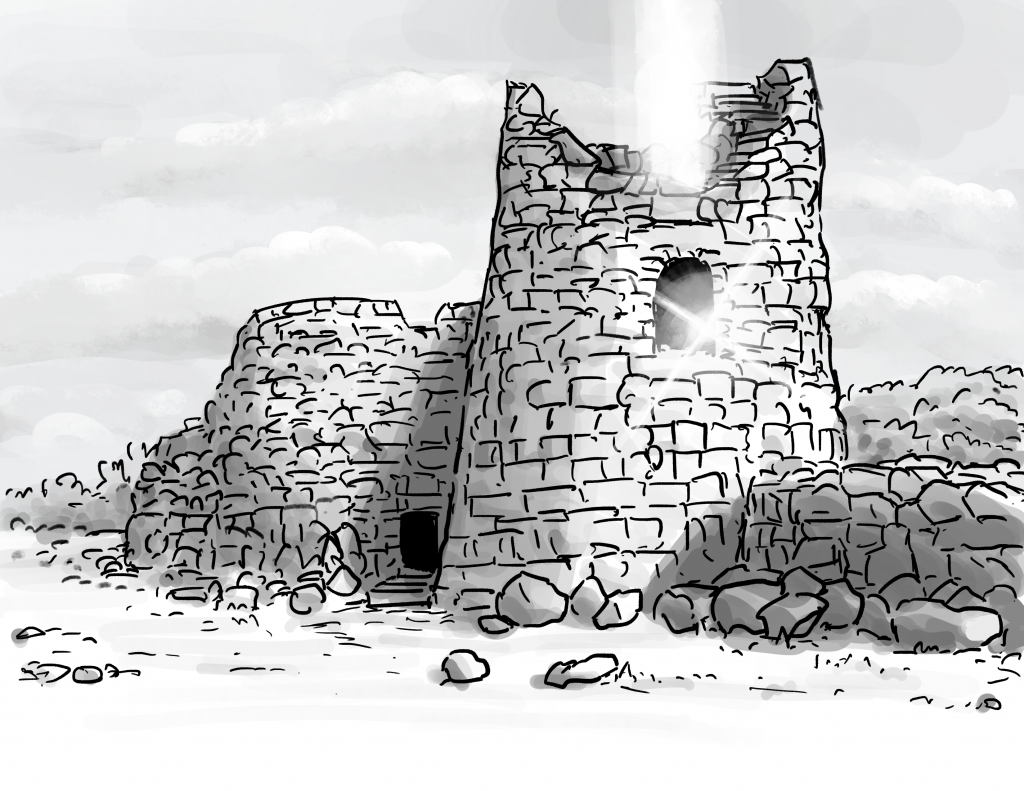
Here is what us God Learners were up to this week.
Lore, Tropes, and Goals: The Problem with New Settings
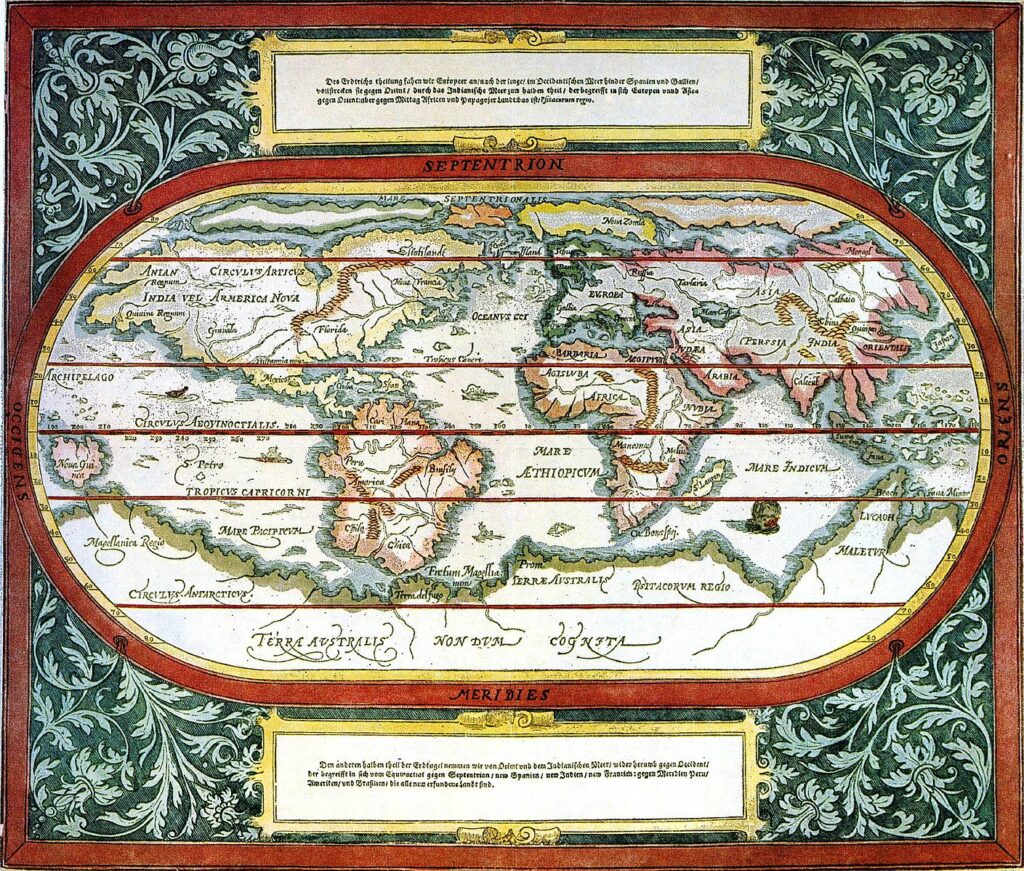
This is not strictly speaking a God Learner thing, but it’s a “Ludo” thing (that’s me) so that counts. Over at my personal blog I wrote an essay that challenges the idea that “too much lore” makes it difficult to approach a setting.
Some people are intimidated by vast amounts of existing lore because they assume that they need to assimilate most of it before they start playing. This is typical with old and multiply-published settings like Glorantha. But that’s not really what’s going on in my opinion.
Think about it for a minute. What is the game setting with the most amount of lore written for it? The Forgotten Realms? Star Wars? Nope, it’s Earth.
Read the rest here. Hopefully you find that article insightful!
Chaosium News
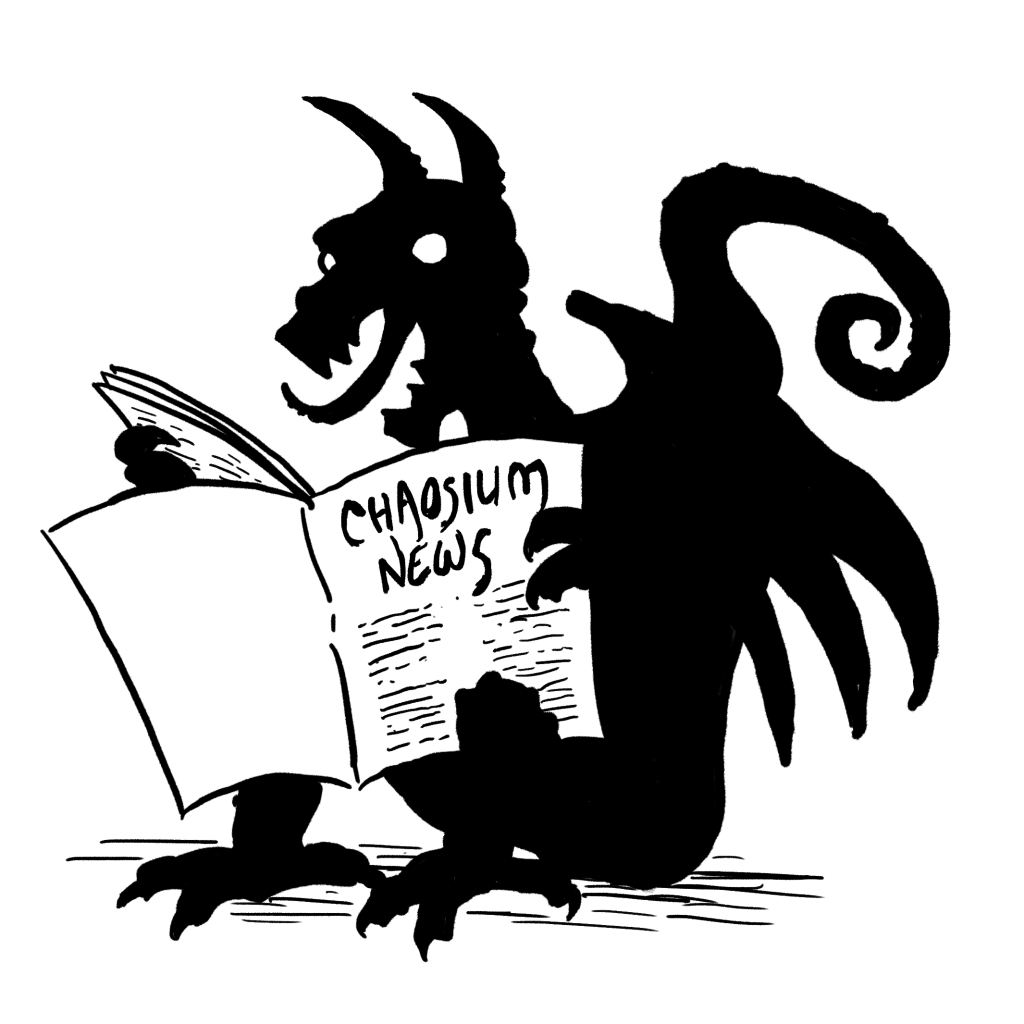
Here are this week’s Chaosium news!
Cults of Glorantha Update
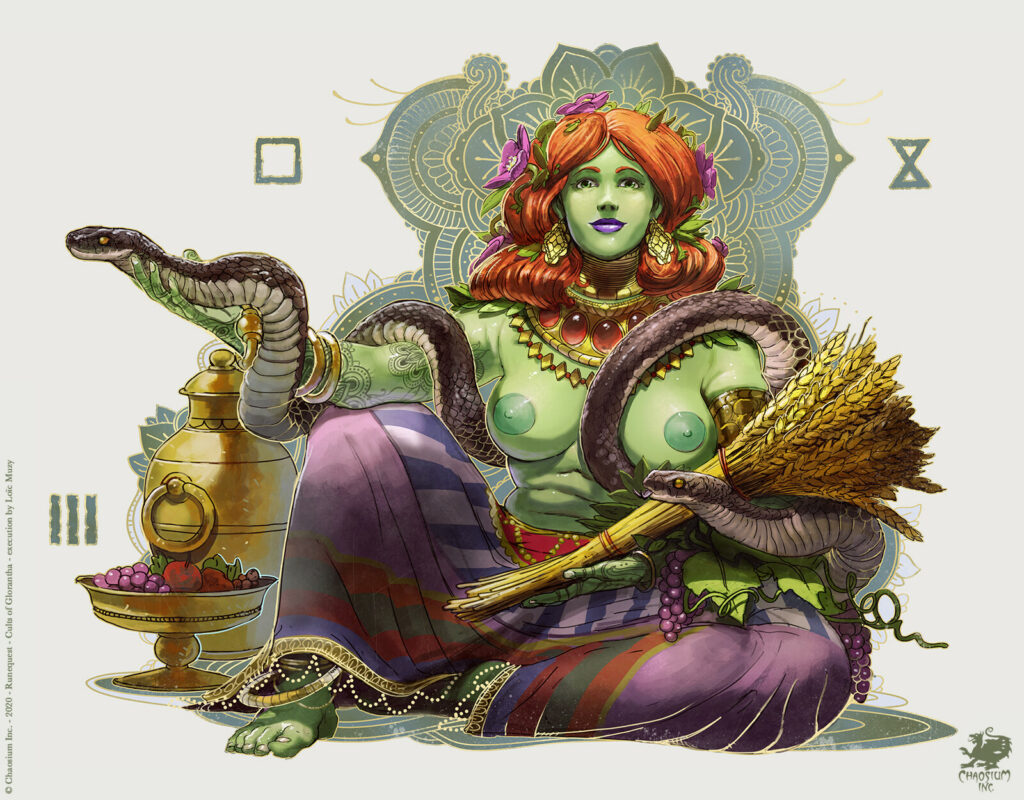
The upcoming Cults of Glorantha was originally slated to be done as a slipcase with two books in it. But the manuscript ballooned from 50-ish cults to more than a hundred, plus a Prosopaedia, and oh yeah, a global pandemic mess up both printing and shipping businesses.
So back in August, Rick Meints was “doubting” that it would be a slipcase set:
We expect that the cults material will be about 800 pages of material when layout is finished. Thus, it will be multiple books. That does not include the Prosopedia.
We doubt it will be a slipcase set.
The newest update on this is from Rick again:
The Cults books will not be sold all at the same time. The Prosopaedia will be one of the first ones sold, as its layout is done.
It’s funny to me because we chatted with Rick back in episode 10, and during the interview I asked why Chaosium wasn’t adopting a “splatbook” model for RuneQuest. In this model, I imagined that there would be individual books for cults or groups of cults that players can buy, thus multiplying revenues compared to books that only a gamemaster would buy (this is one of the ways White Wolf made a lot of money with their World of Darkness line). Back then Rick said that it wasn’t quite possible because of how Gloranthan cults are all intertwined with each other… but now we might actually see these cults released in small groups! Lo and behold, RuneQuest gains splatbooks!
Should I take credit for this? Definitely not. Will I take credit for this? You bet your ass I will!
By the way, Brian Duguid (which we just recently chatted with for our episode on the Hsunchen) made this prediction on Discord that the cult books will be split by “pantheon” (which I agree with), and that this is what will be in each of them:
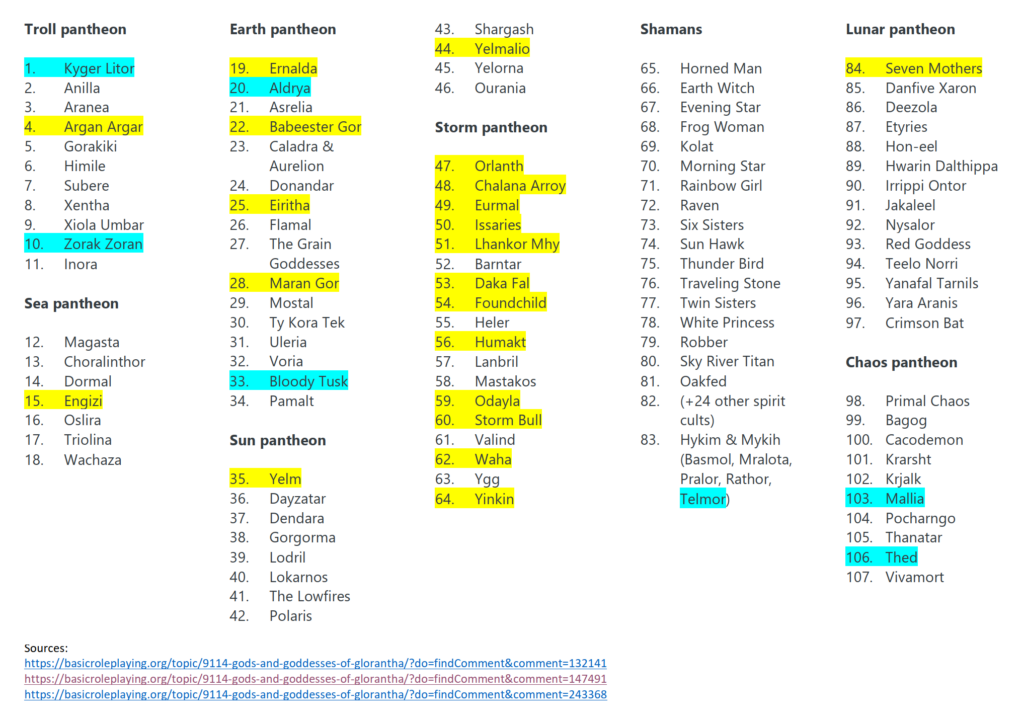
This is all completely useless (but fun!) conjecture of course, but that seems very likely to me. If I had to nitpick anything, I would move a lot of the cult spirits back into their respective “overarching” pantheons. For instance, I would expect that Earth Witch, Kolat, and Sun Hawk would be with the Earth, Storm, and Sun pantheons, instead of in a “shaman cults” book.
Regardless of how Chaosium slices the manuscript, you know that some people will find a way to complain about it anyway. That’s going to be fun…
Give These Creators a Boost
Chaosium is generally very good at supporting their community content creators. Case in point: they have recently given a little push to all the Jonstown Compendium books that are close to earning their first DriveThruRPG medal (the “Copper Best Seller” medal). Of note, they also did the same for the Miskatonic Repository. Time to spend a few bucks and encourage some creators!
A New Hero: Episode 08
The “New Hero” RuneQuest stream continues and I’m still catching up! But I still like it! Looks like they’re still stuck in the Upland Marsh, heee hee.
Jeff’s Notes
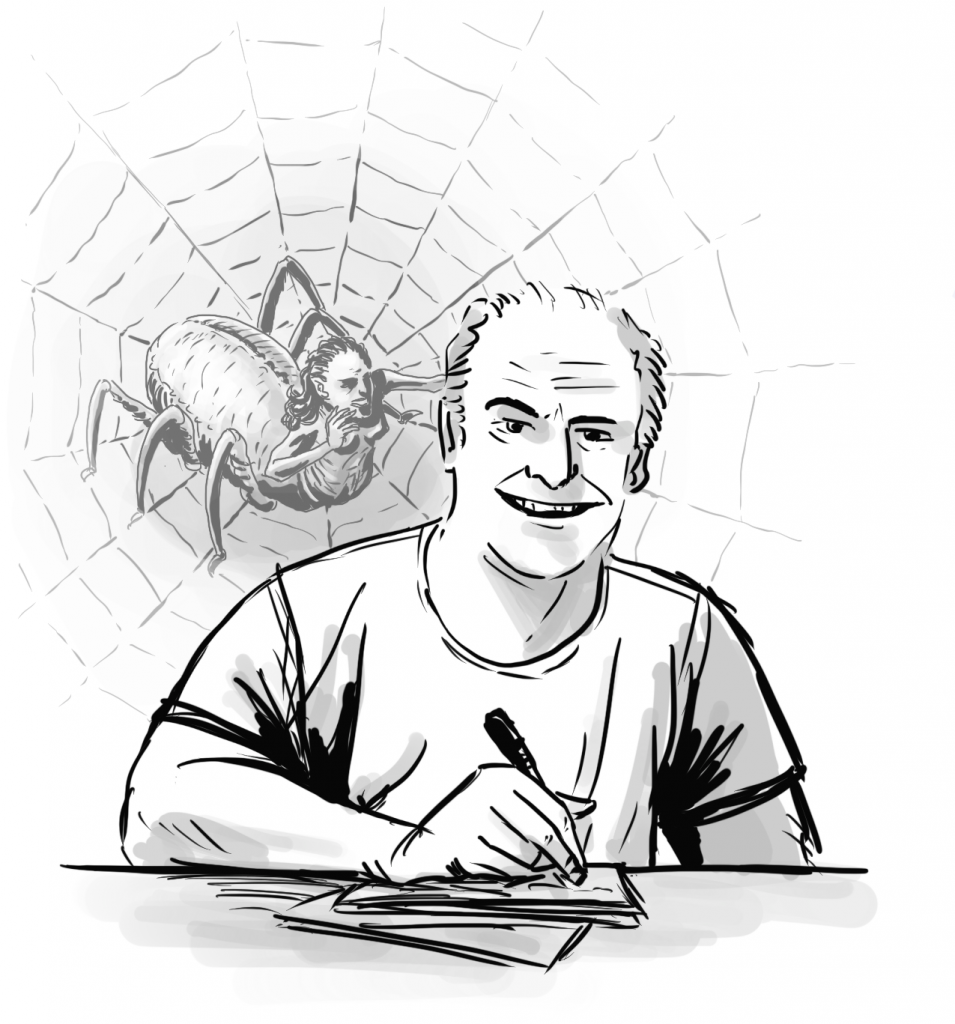
Jeff Richard, the current mastermind on everything Gloranthan at Chaosium, is often posting notes and thoughts on the RuneQuest Facebook group. Here’s our curated list from the past week. A partial archive of these sources is compiled on the Well of Daliath.
Lunar Sages vs Esrolian Sages
In this note on Gloranthan education, Jeff compares Esrolian sages of the Lhankor Mhy cult with Lunar sages of the Irrippi Ontor cult. If you don’t know about Irrippi Ontor, it’s… basically the Lunar Lhankor Mhy. He’s one of the Seven Mothers and as most of them, he used to be human and became a god in Time.
If you’ve read the note (otherwise please do so now), you’ll notice that there’s an overlap in topics, but not in the methodologies to study these topics.
For instance, Lunar and Esrolians both study language, but they differ in their approach. The Esrolians reach to the Empire of the Wyrms Friends, with the language known as Auld Wyrmish. Auld Wyrmish is a tricky beast… it’s the language of dragons, but humans had supposedly lost the ability to speak and understand it back around the time of the Dragonkill War, because the dragons were so pissed off. But humans of the EWF also had previously figured a way to put that language in writing — something the dragonewts and other draconic species never needed. So I guess the dragons forgot to destroy the dictionaries and thesauruses, and humans regained their understanding of it from Second Age documents (although note that, by RuneQuest rules, they can’t get higher than 25% in that skill). On a personal note, I find all this quite ballsy: to do something that the dragons were pissed off about… people have short memory, I guess.
Anyway, this lack of draconic perspective is probably what made the Lunars rather oblivious to what was going on under their own temple construction in Sartar, and why the Dragonrise completely took them by surprise… on the other hand, I imagine that Lunars’ language studies involve a lot more etymology, semantics, semiotics, cryptography, and other such things that might be useful for achieving Illumination or, at least, in waging some Dart Wars across the Empire.
Similarly, both Esrolians and Lunars study music, but I imagine that this differs quite a lot too. Esrolians might research old forms of music and try to emulate the non-written components of draconic speech to better understand it (since “true” Auld Wyrmish is “musical” and “includes auditory, olfactory, and empathic components”). On the other hand, Lunars might innovate with modern music, basically the equivalent of ambient and prog-rock or something, in order to, again, help with Illumination.
The difference in how Lunars and Esrolians study metaphysics seems to be related to the sciences they do not have in common. Lunars study “suprasensorial perception”, i.e. all the meditation and LSD crazyness, while Esrolians study “knowledge”, which sounds like our own modern academia. As a result, I suspect that Lunar metaphysics are trying to be, you know, useful, because they could help deal with phenomenon outside of the mundane world. Nysalorean riddles can be redesigned as jazz songs you need to figure out… Meanwhile, Esrolian metaphysics are probably more like dry philosophical debates… although that could also have applications with, say, heroquesting, assuming nobody comes around and yells “that’s God Learnerism!“, that is.
Dealing with Superheroes
Any Gloranthan campaign will likely, at some point, introduce the setting’s “superheroes” such as Argrath, Harrek, Jar-eel, and so on.
These characters are important enough to be their own chits on the WBRM board game. They are heroes, even “superheroes”. Bringing them into your campaign can greatly enrich your players’ experience and immersion into the setting. But if mishandled, they threaten to steal the spotlight away from the players or worse become GM alter-egos.
Jeff outlines a few ways to handle this: put the superheroes in the background of the PCs’ heroic actions, have the superheroes help the PCs but somehow not take their spotlight, make the PCs companions of the superheroes, make the PCs key allies of the superheroes, or see the superheroes as guest stars with cameos in the PCs’ adventures.
Of course, I’ll add that Jeff’s advice is like a buffet — you’re encouraged to mix all these approaches in your game.
Personally, I find that this is one of my big challenges with Glorantha. Not so much because it’s hard to deal with a superhero with monstrous stats and a metaplot, but because I’m so used to telling “street level” stories. With my current RuneQuest campaign, I have to get myself out of my comfort zone and embrace the “epic heroes” aspect of Glorantha, and that doesn’t come naturally to me…
Battle Rules
Jeff talks about mass battle rules in RPGs:
Something I have long been frustrated by is the tendency that RPG battle rules have always been mass combat rules designed to determine the winner of a battle, rather than something player focusing – that tells us what our player characters did and experience in the battle.
This really depends on what the game is about, and what it’s trying to emulate. It feels rather ironic to me that someone who co-wrote a game that tries to finely model how skirmish combat works (complete with hit locations and individual wounds) does not see the appeal in modelling how mass battles work.
But I get it. RuneQuest’s combat is detailed because it deals with the character’s personal experience. Mass combat focuses on the entire battle, and is removed from that character… unless that character is actually the commander in chief, that is. I don’t have a lot of experience with RPGs with battle rules, but the couple ones I’ve seen do make the assumption that the PCs are in charge. As such, they might not even leave their tent at the top of the hill, and the whole thing is played through preparation, alliances, tactical choices, and successful Strategy rolls. Anyway, that’s another topic.
IMO, the GM should determine the outcome of the battle. That can be based on the player character actions (“if you can’t hold this position, the battle is lost” or “you need to defeat the enemy hero or the battle is lost”) or not (frex, in Shakespeare’s Henry V, the English have no idea that they have won the battle until it is over). In the Grand Pendragon Campaign, the battles take the latter approach (even telling us what Arthur rolled on his Battle skill!).
I personally prefer something a little more interactive with the players – give them a chance to have the spotlight on them (even if you have already decided the results of the battle, it is easy to say that the results are because of the players or despite the players).
I’ve seen some people online disagree or even complain about this bit here — especially from those who uphold player agency as of the utmost importance. There’s a bunch to unpack here.
First, the PCs can only influence so much stuff in the setting. Just as you can protest that the outcome of the battle is predetermined whatever the players do, you could also protest that the starting of the battle was also predetermined! Yet, I don’t know if anybody ever complained about that. Maybe it all happened while the PCs were travelling away from home, and they come back to these terrible news. Or maybe the PCs were at the meeting when the peace negotiation turned sour and the declaration of war happened, but if they were just one of the leader’s bodyguards, it’s not like they could do anything… or could they?
See, to me this isn’t a problem of player agency (not directly, at least) but a problem of narrative framing. What are the PCs really doing at the peace negotiation meeting? If they’re bodyguards that stand on the other side of the door only to witness history, that’s not dramatically interesting. However, if they are the bodyguards that can stop the assassin, that’s a lot more interesting. If they stop the assassin, the Kings and Queens realize that he was sent by a common enemy that was trying to weaken their nations by pitting them against each other. If they do not stop the assassin but still catch him after the fact, the situation become extremely complicated but war can still be avoided. And if they do not stop the assassin at all and he escapes, war is declared!
By shifting the story from “the NPCs are negotiating for peace” to “the PCs try to stop an assassin threatening a member of a peace summit“, we shift the focus from the NPCs to the PCs. In doing so, we bring back player agency on world events that they aren’t supposed to be able to affect usually. This is pretty much what Jeff is talking about, I think.
The other point here is that there is a lot of wiggle room even once the GM has decided the battle’s outcome. The players could still shift things a lot within that outcome. For instance, there’s a big difference between “the Lunars crushed everybody and your tribal king is dead“, “the Lunars won and your tribal king has been captured“, and “the Lunars had a narrow victory but have lost many soldiers, so they left your lands mostly unoccupied and your tribal king has escaped“.
The gamemaster could have decided that the Lunars would win either way, but use the players’ actions and their successes and failures to decide between these three aforementioned outcomes. Those are vastly different outcomes that propel the campaign forward in completely different directions. That still qualifies as player agency in my book. And you can mix that with the previous narrative reframing that puts the PCs at the pivotal moments! For instance, one of the battle scenes could have been the PCs stumbling upon their King, wounded and surrounded by Lunar Tarshite soldiers. It’s up to the PCs to fight/intimidate/negotiate and see whether the King dies, gets captured, or escapes. I’ve heard a few people who placed their PCs near Kallyr in the Battle of Queens, and ended up saving her from Lunar assassins, for instance.
What should be the center of the session’s activity is what the players characters do and experience during the battle. Do they spend most of the battle standing in a line dealing with missile weapons and spells? Do they engage in single combat with champions? Do they try to rush an enemy leader or hero? What goes on elsewhere in the battle is usually unknown to the players and they should only learn about it after the battle is over.
The upcoming RuneQuest battle rules (and their cousin, the upcoming Pendragon battle rules) are doing more or less that. We had an early preview of what these rules might look like in the White Bull campaign S02E09 (although I’m sure that was an early work-in-progress version of the rules, so don’t get hung up on details). Back in issue 12 of the Journal of Runic Studies, I had even taken the time to write a summary of what I gathered from the actual play. This might still be useful as we wait for these rules, possibly in the RuneQuest Gamemaster Guide.
Lay Membership and Extra Magic
The short version of this note is: encourage your players to have their PC become a lay member of a few cults.
So for example, IMG, most full-time warriors in Dragon Pass (and Pavis) are lay members of Humakt. That gets Bladesharp, Fireblade, Protection, Parry, Coordination, Vigor, Strength, and all sorts of other good combat-oriented spells. You also get discount training in sword and other combat skills.
This might affect your Gloranthan world-building a bit but yes, it’s not too hard to become a lay member of Humakt — it’s neutral to a lot of cults, and most people who would be interested anyway (Orlanth or Yelmalio cultists) share the same sort of “honourable behaviour” stuff that is required anyway.
So that’s one way to get extra magic, such as a Yelmalian getting Bladesharp. There’s another way: local cult variants. It’s easy to have a particular shrine or temple worship a variant of the god, a notable hero, a special cult spirit, or whatever that provides one extra/different spirit spell or Rune magic.
Note that the “easy” part is on the gamemaster: take a map of Glorantha and throw a dart at it. That’s where that shrine or temple is. The hard part is for the PCs! They need to learn about it, travel to it, and convince the priest or priestess to let them get that spell! If you’re like me, that will probably take three months of gaming…
How Common is HeroQuesting?
Another good question on heroquesting from the BRP Central forums: how common is it? Jeff answers here and here:
Let’s be precise about terms. Every initiate experiences the Gods World and interacts with it every time the deity is invoked with a successful Worship ceremony. But that’s how far most people go. They stick around the God’s Place, witness the god and its allies, but do not stray.
A few people – mainly Rune Lords and Rune Priests – go beyond this, sticking to more familiar paths and interact with powers and entities outside of the god’s control.
Far fewer people – heroquesters – go off the familiar path and explore the Hero Plane.
So heroquesting is very common when it comes to worshipping, or acquiring new Rune magic… but it’s so safe and common that it’s abstracted with, at most, a simple roll in the RuneQuest rules. The couple times I’ve had players acquire new Rune magic, I did try to spend at least a minute or two describing the ceremony and the heroquest involved in it. But not more than that.
Most every Gloranthan has some experience “on the Hero Plane.” When you sacrifice POW/regain your Rune Points, you experience your deity and gain the connection that allows you to briefly incarnate that deity in the mundane world. Every time you cast a a Rune spell, we get a momentary manifestation of the deity. I think a lot of people understate this – it is not Vasana who casts Lightning, rather it Orlanth’s Lightning Spear that appears in Vasana’s hands. The god is present with every Rune spell.
But that stuff is handled through the Rune spell mechanics, and not what we likely mean when we talk about “heroquesting” […]
Heroquesting that sticks to “familiar paths” can be played but, as people who went through the HeroWars/HeroQuest ruleset can possibly attest, there was something fishy, gameplay-wise, in going through an adventure for which you know what’s going to happen, and you need to act so that it keeps happening that way. Sure, the rulebooks did recommend to throw a few surprises here and there, but by and large it was a scripted affair.
To gain new powers, new gifts (and new banes and geases), you need to go outside and explore the Hero Plane. You might be armed with your stories, but they are simply guides of how things might be done – and things might not go that way. You need to make your own stories, participate in your own experiences, and risk transformation. That’s not easy – in real life or in gaming. That’s why people keep retreating to the King of Dragon Pass version of heroquesting – it is safer, more predictable, easier to control, and less likely to radically transform your character (and even your cult). But that is not really heroquesting.
So as far as I can tell, the new approach that Chaosium is taking with the upcoming RuneQuest rules is to focus almost entirely on the last category outlined in the first quote: people who treat the God Time like Oz or Narnia or Wonderland or whatever. It’s heroquesting as isekai, more or less. You go to the God Time to try and solve a problem (get some McGuffin, destroy a source of evil, whatever), and you have to survive long enough to get there, and not mess up your community and yourself in the process.
Community Roundup
The community roundup is our highlight of interesting things being mentioned in the Glorantha-related Facebook groups, sub-Reddits, and other similar online places.
Update on the Escalation! Magazine Lunar Issue
Evan posted this update about the upcoming Lunar issue of the 13th Age focused “Escalation!” magazine:
And the final pieces of the manuscript are now with art and layout. Those “departments” are one fantastic person who does it out of love and kindness and has other real world responsibilities and priorities, so it won’t happen fast, but her part of Red Moon and Warring Kingdoms will be amazing. I feel totally unworthy of the art that has already been produced! All hail the Reaching Moon! We Are All Us
As a reminder, we have seen two pieces of work-in-progress art for this:
Six Ages Sequel Update
Here’s the latest of the Six Ages: Ride Like the Wind sequel, tentatively called “Lights Going Out” (it’s set during the Great Darkness).
The big change that occurred between “Ride Like the Wind” and “Lights Going Out” is the destruction of the cosmic mountain which housed the Celestial Court. Needless to say, the world was a much worse place afterwards.
Here’s an “early draft image“:
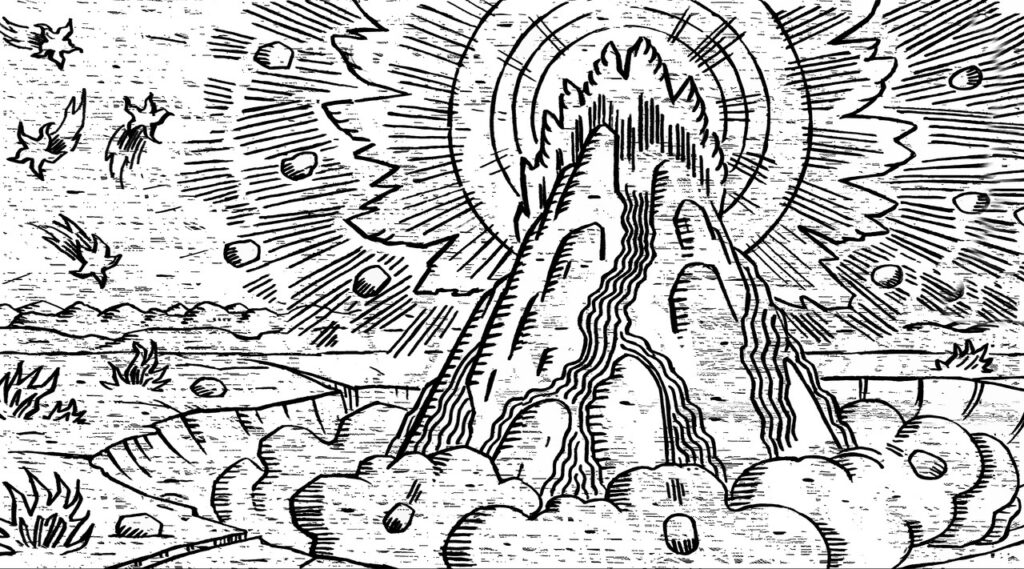
As for the current status of the game, they’re getting through the artwork backlog and working on music, testing and tuning. Here’s some artwork:
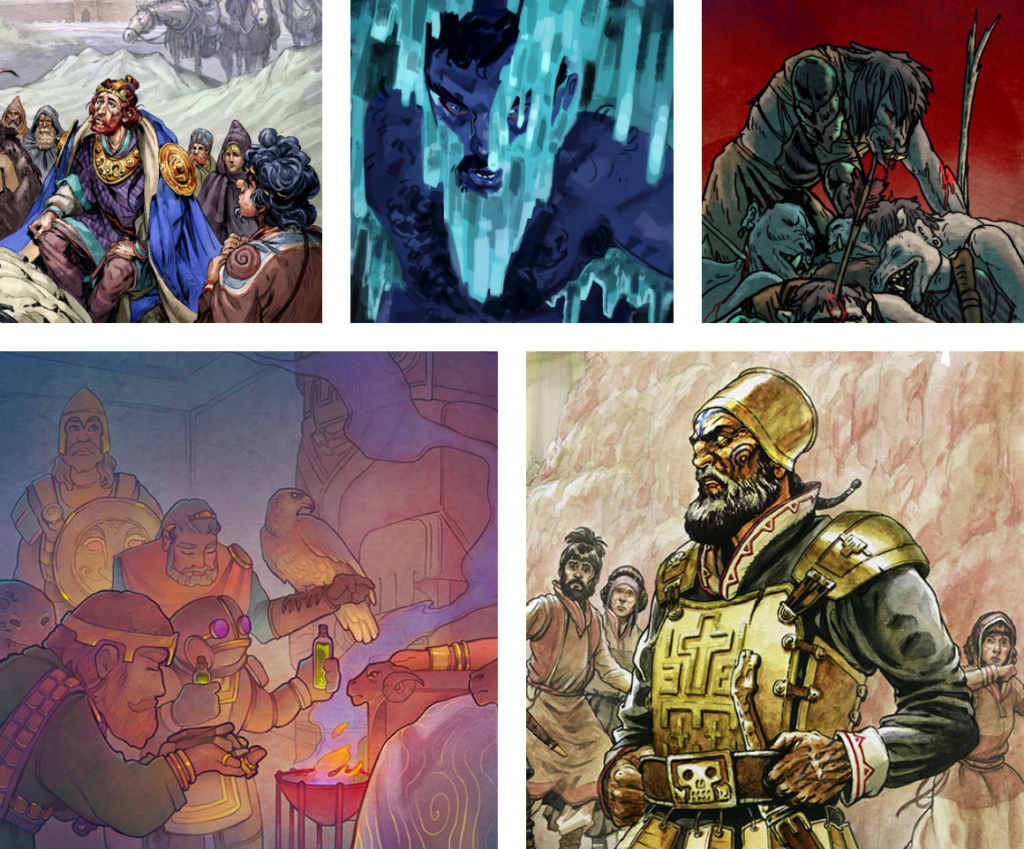
Thank you for reading
That’s it for this week! Please contact us with any feedback, question, or news item we’ve missed!
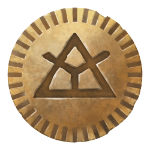
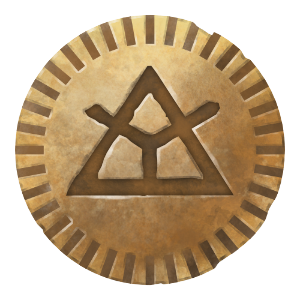
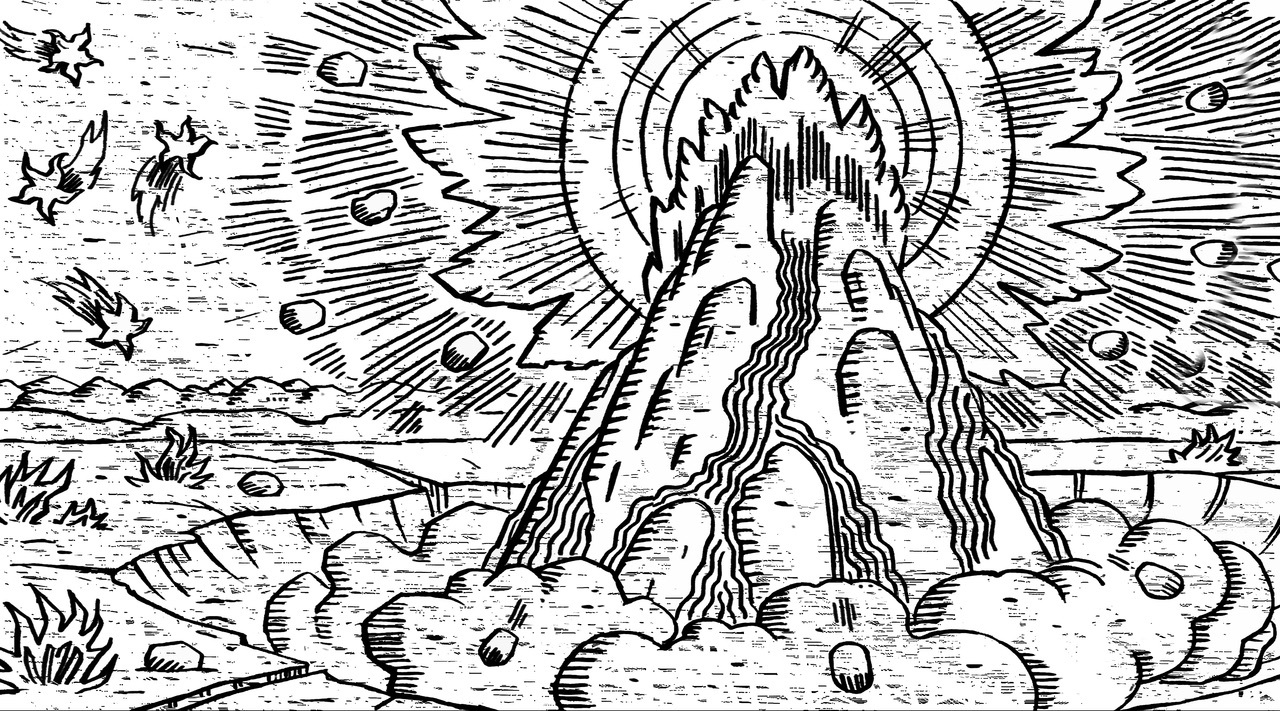
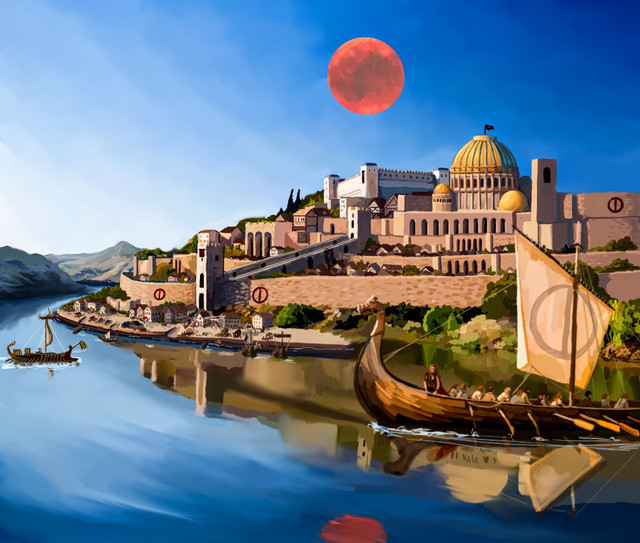
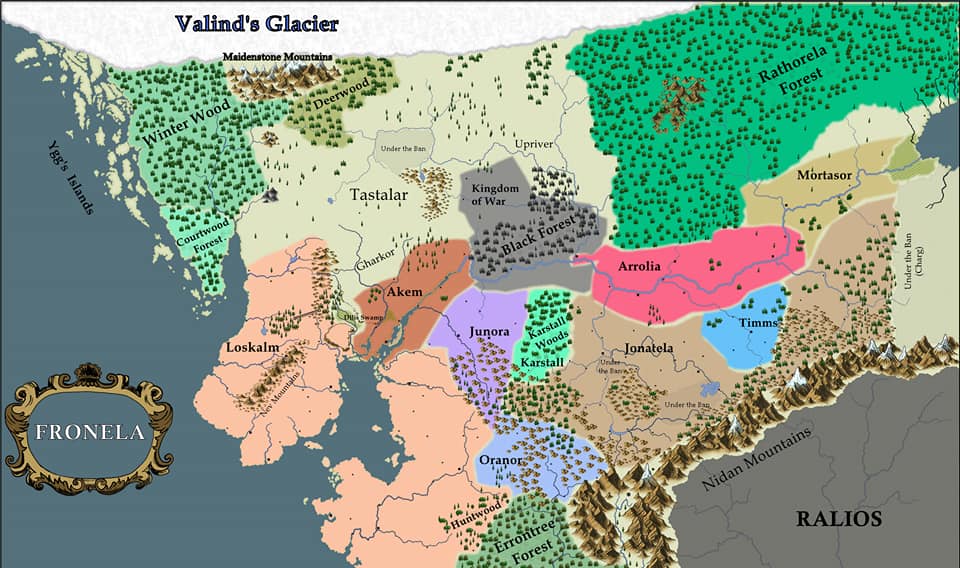
Hey Ludovic,
I enjoy all the episodes of the podcast you put out, but have been reticent to commit to reading your newsletter regularly until now. Please add me to any and all mailing lists for the latest news on Glorantha etc. I would happily answer questions on total noobiness in Runequest as it has been a lot of fun from the get go.
Cheers,
Tristan
Hey Tristan! Thanks. If you want the email version of the newsletter you can normally sign-up on the following page, but I added you directly so you should be all set! https://godlearners.com/journal-of-runic-studies/